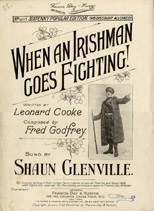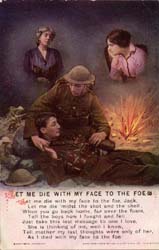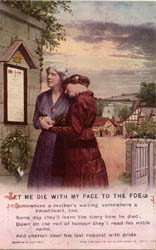Fred Godfrey’s Services (War) Songs
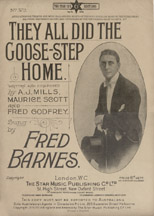 |
Fred Godfrey gained a well-deserved reputation for writing songs about the lads in the military services. His earliest known effort along those lines was a great hit that he always claimed to have written but for which he never received credit: Ship Ahoy! (All The Nice Girls Love A Sailor) (1908; the credits go instead to Godfrey’s frequent collaborators A.J. Mills and Bennett Scott). Godfrey also wrote Ev’ry Girl Loves A Military Man! (with John P. Harrington & Orlando Powell, 1910); Why Can’t The Girls Be Soldiers? (with John Neat, 1911); and two services songs for Australian-born Music Hall star Billy Williams: Since Father Joined The Territorials (1909) and Oh, The Sailors Of The King (1912).
With the coming of the Great War, Britain’s songwriters got hard at work composing Music Hall ditties intended not only to encourage voluntary recruitment but also to reassure anxious civilians that the Hun would be quickly sent packing. Before long, Fred Godfrey, his ear well-attuned to the demands of music publishers and Music Hall audiences, was doing his songwriting bit for the war effort. Nineteen-fourteen alone saw the publication of An Entente Cordiale In La Belle France; Good Luck, Little French Soldier Man; It’s The Same Old Tommy And The Same Old Jack!; It’s The Way They Have In The Navy; My Little Red Cross Girl; When An Irishman Goes Fighting; and When I Hear Those Bells Of Brittany.
In 1915, Godfrey supplied morale boosters Follow The Sergeant; Save Your Kisses Till The Boys Come Home; Little Rosalie, My Pretty Refugee; Mister Sergeant Michael Donoghue; Oh For The Sight Of A Girl; Sergeant Macadoo; There’ll Be Nothing But Boys In Khaki By The Seaside; They All Did The Goose-Step Home; and Tommy’s Learning French. He also provided the lyrics for a perhaps deservedly obscure bit of mawkish and already outdated military romanticism entitled Let Me Die With My Face To The Foe, the cover of which, nightmarish as it is, hardly begins to portray the horrors of combat.
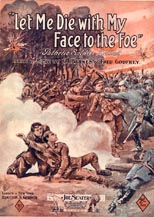 |
The Great War became even greater and more dreadful in 1916, the year of the Somme battles and the imposition of conscription to replenish the terrible wastage of lives in the trenches. It also saw the introduction of a somewhat more cynical tone in the war song genre. Fred Godfrey’s most famous contribution to that new weariness of spirit in song was his immortal Take Me Back To Dear Old Blighty. By then, the Tommies were more interested in going home than in defeating the Germans, but were resigned to doing their bit, and songs like Blighty helped them to let off steam. Also in 1916, Godfrey saluted troops from Down Under in Coo-ee! Coo-ee! (The Anzac Boy), urged sweethearts back home to Send The Boys A Little Snapshot (Of The Ones They’ve Left Behind), offered comfort to the wives and sweethearts of the many Roman Catholics fighting on the Western Front with You Gave Me A Rosary, and reminded civilians that We’ve Got To Put Up With It Now.
 |
This song collection includes Godfrey’s Down Texas Way, a favourite with the Tommies |
Fred Godfrey’s turn to be called up finally came in 1917, and he found himself in the Royal Naval Air Service (RNAS) stationed at various airship bases in the the south of England and for a time over in France, tugging on the mooring lines of dirigibles, well back of the front line. As he related in a 1941 letter to a British newspaper, he spent much of his time entertaining the troops on the piano, playing his hits and a new song that the boys got a big kick out of, Bless ’Em All — though, as Godfrey primly noted in his letter, the lyric wasn’t “Bless.” Of course, the song lent itself to endless variations on the theme and was hardly the sort of thing that would have been considered for publication. After the war, the song became a kind of unofficial anthem of the Royal Air Force, the successor to both the RNAS and the Royal Flying Corps, and it was not until 1940 that, with fresh, clean lyrics, it finally appeared in a respectable civilian guise.
Godfrey found himself back on “Civvy Street” early in 1918, sprung, according to family legend, with the help of a visiting member of the minor nobility who thought he could make a more useful contribution to the war effort by writing morale-boosting songs back in London. In any event, someone must have pulled strings somewhere, as Godfrey quickly got back to the songwriting. He penned only one other services song before the Armistice, however, a Shaun Glenville number called Soldiers Like It.
|
An Indian pressing of Home Guard Blues, purchased in London and now in the author’s collection in Canada. Imagine the tales it |
||
 |
 |
In the interwar years people weren’t much interested in songs about military service, but Godfrey did score in 1931 with Skin-A-Ma-Link The Sergeant. The outbreak of World War Two, however, once again had the songwriters scrambling to supply suitable material. Among those who got into the new spirit of the times most enthusiastically was Britain’s top box office film star and recording artist, George Formby Jr., who, in November 1940, was the first to record Godfrey’s old Bless ’Em All, though with sanitized lyrics by two staff writers at Keith Prowse Music (click on the title to go to the page that contains the full story of this famous song). Formby had an almost insatiable appetite for appropriate new material, and in 1942 recorded three more Godfreys songs: Out In The Middle East; Oh! You Have No Idea; and Home Guard Blues, which was also featured in the 1943 Formby film Get Cracking. The following year Formby accepted Godfrey’s Mister Wu (Is In The Chinese Navy Now); Only A Poor Little Private; and (possibly; the date is uncertain) Rolling Into France; Formby never got around to recording these, though Alan Randall had a go at Mister Wu in 1974.
The only other services song of note that Godfrey had a hand in writing was Fed Up And Far From Home, originally penned by American composer John Frederic Barth and published in Cleveland by Sam Fox Publishing in 1910. Perhaps because it had omitted Godfrey’s name from the printed sheet music of Bless ’Em All, in 1941 Keith Prowse Music dusted off the old melody and asked Godfrey to write new lyrics for the new conflict. Performed over the radio, Fed Up And Far From Home became a minor singalong hit. Although quite a few people — including George Formby — seem to have performed the song, judging by published sheet music covers, the only known recording is in a medley of choruses for an RAF charity disc.
Listen to a 1913 |
Listen to a 1942 recording of |
Listen to a 1942 recording of |
